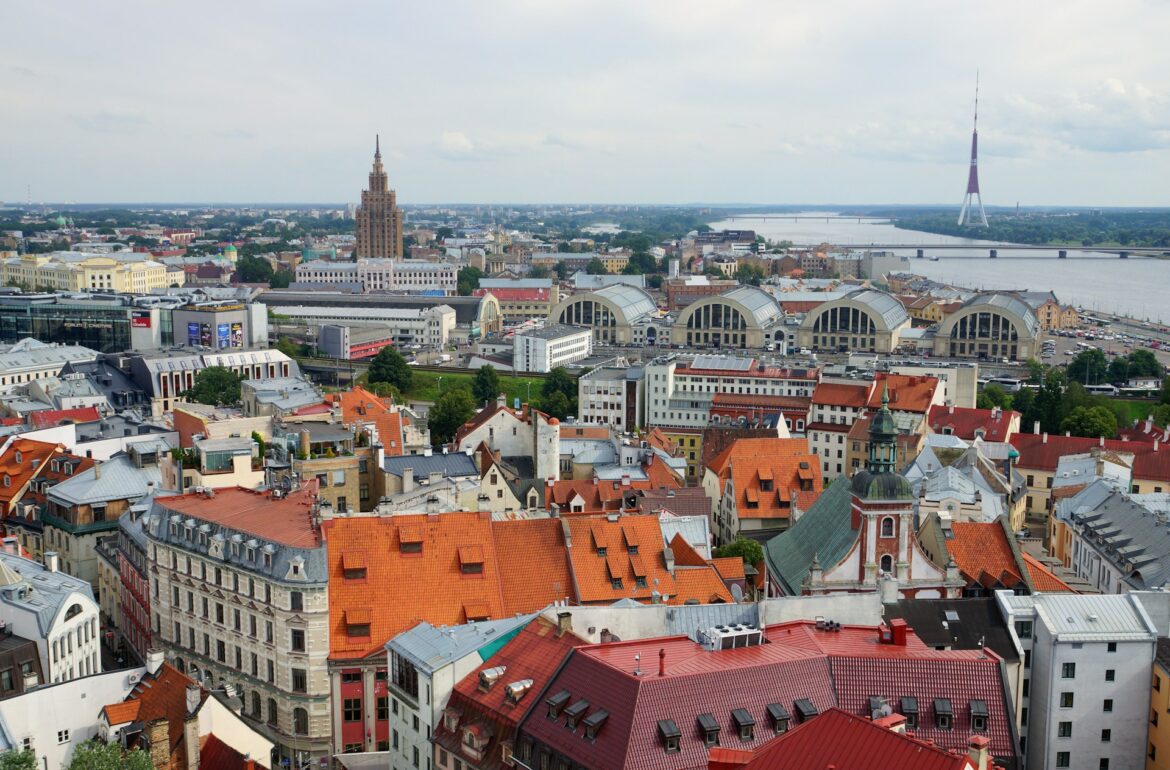Riga, Latvia’s vibrant capital, is no longer Europe’s best-kept secret. Nestled between tradition and innovation, Riga combines affordable living with rich history, cobblestone charm, and a creative spirit. In 2025, the cost of living remains moderate compared to Western Europe, but evolving trends—like rising tourism, growing foreign student populations, and expanding tech hubs—are shifting the city’s economic landscape. Whether you’re a digital nomad, student, or relocating with a family, understanding the real cost of living in Riga helps you budget wisely, avoid surprises, and enjoy your life in the Baltic capital.
Housing and Utilities: Rent is Still Reasonable, But Rising
Rent is one of the most important factors when calculating the cost of living in Riga. Riga’s housing market remains one of the most affordable among EU capitals, though demand is catching up. A one-bedroom apartment in the city center now costs around €609 per month, with newer and more renovated units fetching higher prices—especially in neighborhoods like the Quiet Centre (Klusais Centrs) or Old Town (Vecrīga), where rental prices have steadily increased due to their popularity among expats, students, and Airbnb investors. In contrast, more suburban districts like Āgenskalns, Purvciems, and Imanta offer lower prices, averaging around €437 per month for similar units, with more space and greenery.
-
One-bedroom in city center: ~€609/month
-
One-bedroom outside center: ~€437/month
-
Utility bills in winter: €150–300/month
-
Utility bills in summer: €100–150/month
-
Internet (fiber): ~€19/month
-
Top rental yield: up to 11.68% in Āgenskalns
Utilities, however, have become a bigger chunk of monthly expenses. Latvia’s cold winters mean heating costs spike between November and March, especially in older buildings without proper insulation. On average, expect to pay €150–300 per month for utilities during winter, and around €100–150 in summer. Internet remains fast and affordable, averaging just under €20 per month for high-speed fiber. Many newcomers are surprised by the sudden jump in winter heating costs—something to factor into your annual budget.
For those considering long-term stays, buying property remains attractive. In 2025, Riga offers rental yields as high as 11.68% in districts like Āgenskalns. Real estate investors are also looking at Grīziņkalns and Mežaparks for their growth potential, thanks to urban regeneration and improved transport links.
Grocery Shopping and Food: Affordable and Fresh
Food in Riga is delicious, seasonal, and budget-friendly. Monthly grocery costs for a single person range from €200 to €300, depending on eating habits and where you shop. Riga has plenty of supermarkets like Rimi, Maxima, and Lidl. If you want to save money, visit the Central Market for fresh produce, meats, and dairy. This helps lower your cost of living in Riga significantly. Essentials like milk (€1.65/L), bread (€2.52/kg), and eggs (€2.72/dozen) remain reasonably priced, and local produce—especially in season—can be incredibly cheap at markets like Central Market (Centrāltirgus), which continues to be a favorite among locals and expats alike.
-
Monthly groceries: €200–300 per person
-
Milk: ~€1.65/liter
-
Bread: ~€2.52/kg
-
Eggs: ~€2.72/dozen
-
Restaurant meal: ~€13
-
Dinner for two at mid-range: ~€65
-
Beer at bar: ~€5.25
-
Fast food/lunch menus: €7–8
Dining out has become slightly more expensive due to rising labor and energy costs. A meal at an average restaurant costs around €13. For fast food or lunch specials, expect to pay €7–8. Upscale restaurants in the city center will set you back around €65 for two, including drinks. That said, Latvia’s flourishing café culture offers great food at excellent prices—perfect for working remotely while enjoying a warm bowl of grey peas with speck or an elaborate Baltic brunch.
Local beer and spirits are still cheap compared to other EU capitals. A pint of domestic draft beer costs around €5.25 at a bar, while supermarket bottles can be found for as little as €1.50. Wine and international alcohol are slightly more expensive due to import duties, but the variety is solid.
Transportation: A Compact, Connected Capital
Riga’s public transportation system is reliable, clean, and affordable. The city offers buses, trams, and trolleybuses that run frequently and serve most neighborhoods. A single ride costs €1.50, while a monthly public transport pass is €65.60. Students and seniors receive significant discounts, and in 2025, Riga introduced a smart ticketing system that caps daily fares—a win for occasional travelers.
-
Public transport single ticket: €1.50
-
Monthly pass: €65.60
-
Gasoline: €1.60–1.67/liter
-
Popular transport: electric scooters in summer
-
Parking in city center: expensive and limited
-
Rail Baltica: under construction, boosting property values
Gasoline prices average €1.60–1.67 per liter, and traffic congestion is mostly limited to rush hours and the bridges crossing the Daugava River. Parking in the center is regulated and increasingly expensive, pushing more residents to rely on public transport or electric scooters, which have become wildly popular during the warmer months.
For those commuting longer distances or visiting the suburbs, the expansion of Riga’s train and suburban bus lines continues to improve accessibility. Looking ahead, the much-anticipated Rail Baltica project will connect Riga directly with Tallinn, Vilnius, and Warsaw, cutting travel times and possibly raising property values in transit-friendly districts.
Healthcare: Quality Public Services, But Private Clinics Are Preferred
Latvia’s public healthcare system is functional and accessible for residents, but long wait times and language barriers sometimes push expats toward private providers. A general practitioner visit at a private clinic costs around €40–50, while specialist appointments can go up to €70. Emergency services remain affordable and effective, especially for EU citizens with the European Health Insurance Card.
-
GP visit (private): €40–50
-
Specialist visit: up to €70
-
Pharmacy: common meds cost €5–10
-
Health insurance: €50–100/month
-
Public healthcare: free for residents but with wait times
Pharmacies are plentiful and staff generally speak English. Common medications like cold remedies or antibiotics (when prescribed) cost between €5–10. Health insurance is highly recommended for expats, with premiums averaging €50–100 per month for good private coverage. Many policies cover dental, vision, and even some alternative therapies, making it a wise investment for peace of mind.
Entertainment, Leisure & Culture: Life Beyond the Budget
Riga’s rich cultural scene ensures that even those on a modest income can enjoy a high quality of life. Museum tickets average €3–5, and many institutions offer free admission days. The Latvian National Opera offers stunning performances for as low as €7 per ticket, and the city’s annual events—like the Song and Dance Festival or Riga Restaurant Week—deliver unforgettable experiences for minimal cost.
-
Cinema ticket: ~€10.50
-
Gym membership: ~€47/month
-
Opera ticket: from €7
-
Free parks, forests, and beach access
-
Seasonal events: most offer free or low-cost entry
A cinema ticket costs about €10.50, while monthly gym memberships hover around €47. Outdoor lovers can enjoy Riga’s many parks, beaches (like Jūrmala, just 30 minutes away), and forest trails free of charge. Whether it’s summer open-air concerts or winter skating rinks, Riga has a way of making leisure feel luxurious—even on a budget.
Education & Family Life: Affordable, but International Schools Add Up
Public education in Latvia is free and well-structured, though primarily in Latvian. For expat families, international schools are the go-to option. Tuition fees for top institutions like the International School of Riga range from €7,000 to €18,500 per year, depending on grade level. Kindergarten can cost around €400–500 per month in private institutions.
-
Public school: free
-
International school: €7,000–€18,500/year
-
Private kindergarten: €400–500/month
-
Family subsidies: available for residents
-
Safe, green, family-friendly city
That said, Riga offers several municipal benefits to families, including subsidies for activities, after-school programs, and free or reduced public transport for children. The city is considered family-friendly, with plenty of green space, safe streets, and low violent crime rates.
Average Salaries & Taxes: Wages Growing, but So Are Expenses
In 2025, the average net salary in Riga is approximately €1,294 per month. This represents a steady increase from previous years, reflecting Latvia’s ongoing economic development and rising living costs. The minimum wage has also risen to €740/month, a welcomed but modest improvement amid inflation.
-
Average monthly salary: €1,294
-
Minimum wage: €740/month
-
Income tax: 25.5% up to €105,300/year
-
High earners taxed at 33%
-
Social contributions: paid by employer and employee
Latvia has a progressive income tax system: 25.5% for annual income up to €105,300 and 33% beyond that. Social security contributions are split between employers and employees, adding to the total tax burden. Despite this, many professionals—especially in tech, media, and remote roles—find they can live comfortably and save, provided they manage heating and housing wisely.
Trends & Insights: What’s Shaping Riga in 2025
Several trends are redefining Riga’s cost of living. First, remote work has exploded post-pandemic, and Riga’s affordable apartments, fast internet, and strong café scene have made it a hub for digital nomads. Hybrid work arrangements are also pushing demand for serviced apartments and co-living spaces in the city center.
-
Remote work rising: more digital nomads
-
International students growing
-
Property investment increasing
-
Café and co-working scene booming
-
Rail Baltica will increase connectivity and demand
Second, student numbers are growing. Riga Stradiņš University and the University of Latvia now host thousands of international students, increasing demand for mid-range rentals and boosting local businesses. These young expats also shape the city’s nightlife, café culture, and tech startups.
Third, real estate investment is booming. Riga’s rental yields—some of the highest in the EU—have attracted investors from Scandinavia and Germany. Neighborhoods like Grīziņkalns and Teika are undergoing rapid development, with new cafes, coworking spaces, and cultural centers popping up alongside traditional wooden homes.
Finally, the upcoming Rail Baltica project is expected to transform Riga’s regional connectivity, making it even more appealing to commuters and tourists. With 1.1 million tourists visiting Riga in 2024, the city continues to grow—not just in size, but in confidence and complexity.
Compared to most EU capitals, Riga remains affordable—but it’s not the hidden bargain it once was. Housing, utilities, and schooling are rising, while salaries are climbing more slowly. Still, with thoughtful budgeting, Riga offers high quality of life, excellent public services, and a charming mix of old-world atmosphere and modern convenience.
It’s a place where you can sip a €2 espresso under Art Nouveau facades, bike through pine forests, and enjoy a thriving cultural calendar—all without breaking the bank.

